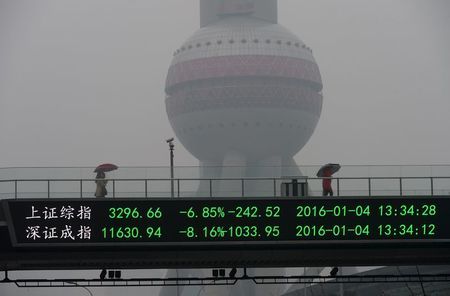 Most Asian stocks fall on North Korea nuke fears, China data
Most Asian stocks fall on North Korea nuke fears, China data
Chinese Stock Market Tanks, Trading Halted
 Most Asian stocks fall on North Korea nuke fears, China data
Most Asian stocks fall on North Korea nuke fears, China data
Dillon Hess
|
11 January, 2016, 01:43
Recommended
- Azim Premji 'Most Generous Indian' for Third Year Running
- Netflix internet TV network available in Serbia
- Chinese markets open higher after day's suspension
- Corps expects to open spillway to divert river water
- Jon Gruden denies interest in Eagles head coach job
- Faraday Future Unveils 1000HP Concept Car, Investing $1 Billion On EV Facility
- String of Storms Hitting California Due to Strongest El Niño on Record
- Jennifer Lawrence up for Best Actress in 'Joy'
- VW exec sees US fixes soon in emissions test cheating
- Callaway Cranks Out The 2016 SC600 Chevy Camaro
- Miss Columbia Agrees to a Sit Down With Steve Harvey
- Mitt Romney: Ted Cruz 'natural born citizen'
- Great idea for horror film gets lost in 'The Forest'
- Bill Belichick throws his support behind Chip Kelly the GM
- Target collaborates with SoulCycle for a line of basic clothing, free classes
Trending Now
Dont Miss
Popular destinations
- Best Non Gamstop Casino
- Non Gamstop Sites
- Casino Not On Gamstop
- Casino Not On Gamstop
- Casino Online Non Aams
- Non Gamstop Casinos
- Sites Not On Gamstop
- Non Gamstop Casinos Uk
- Sites Not On Gamstop
- Non Gamstop Betting Sites
- Best Online Casino Canada
- Online Casinos Not On Gamstop
- オンラインカジノ 一覧
- Mejores Paginas De Poker
- Gambling Sites Not On Gamstop
- Casinos Not On Gamstop
- UK Casinos Not On Gamstop
- Non Gamstop Casino Sites UK
- Slots Not On Gamstop
- UK Online Casinos Not On Gamstop
- UK Casino Not On Gamstop
- Meilleur Casino En Ligne France
- Meilleur Casino En Ligne
- Casino Not On Gamstop
- Bookmaker Not On Gamstop
- Casino Non Aams
- Meilleur Casino En Ligne Belgique
- Jeux Casino En Ligne
- Casino Online Esteri
- カジノ 仮想通貨
- Casino Live
- I Migliori Siti Poker Online
- Casino En Ligne Avis
- Migliori Casino Non Aams
- 코인카지노
- Casino En Ligne Français
- Nouveaux Casino En Ligne
- Casino En Ligne France
- Casino En Ligne France
